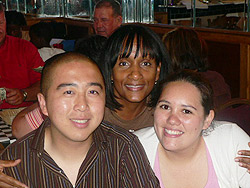Berkeleyan
 The unique culture of New Orleans and the resilience of its people were evident to Berkeley participants in "Voices From the Margins" - a campus effort to preserve Katrina survivors' writings and oral histories - as they toured the city, got to know children in a FEMA-trailer encampment, met with Mayor Ray Nagin, and got in the spirit of Mardi Gras during a working visit there this summer. (Victoria Hamilton photos; Mayor's Office photo by Arlina Westbrook) |
Preserving Crescent City culture
Berkeley-led research team gives 'voice' to displaced Katrina survivors through oral narratives, poetry, and prose
![]()
| 30 August 2006
| Gulf Coast projects for the long haul Three Berkeley-based projects in New Orleans aim to build ongoing relationships in an area at times overrun, to the dismay of many Katrina survivors, with short-term or even one-time volunteer visits. |
For English-department lecturer Antoinette Chevalier, last year's disaster in New Orleans is anything but academic. A native of the city's 13th Ward who specializes in Victorian literature, Chevalier had barely touched foot on campus last fall when Hurricane Katrina struck home. The storm, and the subsequent failure of the levees, forced Chevalier's nanaine and disabled parrain (Creole for godmother and godfather), her closest living relatives, to take refuge on the second floor of their house to await rescue for nearly a week, and then to move to a small town outside New Orleans, where a long-promised FEMA trailer has yet to materialize.
Though her own family, that of her husband, and scores of friends were wiped out materially by the disaster, Chevalier is quick to note that her own story is not unlike that of many others - and a lucky one, at that, when she compares herself with those who lost loved ones.
She was witness to many such accounts this summer - not only in casual conversation with kith and kin, but through "Voices From the Margins," a Berkeley-based project to capture the oral histories and writing of survivors and thereby help document and preserve New Orleans' unique culture.
 Lecturer Antoinette Chevalier (center) and students Gene Hwang and Brandy Gamoning of the "Voices" project take a break in Louisiana's summer heat. (Victoria Hamilton photo) |
"I found myself, in the middle of all the sadness, falling in love with the city," recalls fifth-year Berkeley molecular-and-cell-biology major Gene Hwang - a poet, DJ, and pianist originally from Taiwan, who interviewed New Orleans musicians during his virgin visit to the Crescent City. Hwang says one image in particular is etched in his memory: standing on a New Orleans street ravaged by floodwaters from the levee breaks. "I could see the coffee stain on every building. It changed me deeply, probably for the rest of my life," he says.
Brown-bag, Sept. 7, considers Katrina's social legacy On Thursday, Sept. 7, from noon to 1:30 p.m., professors John Brown Childs, William Russell Ellis Jr., and Hardy Frye will discuss their contributions to Hurricane Katrina: Response and Responsibilities, one of the first scholarly works to be published on Katrina. A collection of critical and personal essays on social issues laid bare by the storm, the book seeks to fill the gap between news reporting on the disaster and more in-depth writing on the subject likely to emerge in the coming years. The event will include a short documentary on grassroots organizing in New Orleans post-Katrina. John Brown Childs is professor of sociology at UC Santa Cruz. Frye - an Alabama native who served as a SNCC organizer during the Civil Rights era and went on to teach at Santa Cruz - currently teaches African American Studies at Berkeley. Ellis is a Berkeley professor emeritus of architecture whose works include Architects' People and Race, Change, and Urban Society. This brown-bag colloquium - to be held in Boalt's Goldberg Room, on Bancroft Way just west of Piedmont Avenue - is free and open to the public. Copies of the book will be on sale, with all proceeds going to the People's Hurricane Relief Fund and Vanguard Public Foundation. For information, contact Mahad Ibrahim at mahadi@sims.berkeley.edu or 642-0813. |
How survivors make sense of the disaster and what internal resources have helped them cope were among the questions that students explored in their videotaping sessions with survivors. In interviews conducted by Clark-Atlanta University student Frankia Granberry and Victoria Hamilton of Fisk University, Agee noted emerging themes. For some of those interviewed, she says, "The storm had washed their sins away and brought a new beginning." The black diaspora of the slave trade was another common thread in accounts of African American survivors: "The storm has split their families up, and they have to migrate to get back together again."
For Berkeley student Bonnie Ho, interviews with Latina and Asian survivors "show how widespread the trauma went and still goes.. The word 'home' is what so many people have on the tips of their tongues," she notes. Now, "when I read about New Orleans in the paper, I can really feel the people."
The Voices team is creating a multimedia website, a video documentary, and an anthology of poetry and prose by Katrina survivors and others - all with the goal of making a lasting contribution to the "preservation of New Orleans culture, of its people, of this rebuilding project," as Chevalier puts it. On Thursday, Nov. 30, the group plans to hold a campus event (details of which will be posted at voices.berkeley.edu closer to the time) to showcase the images and words of New Orleanians and share plans for ongoing connection with displaced Katrina survivors as they struggle to rebuild their lives and their city.

